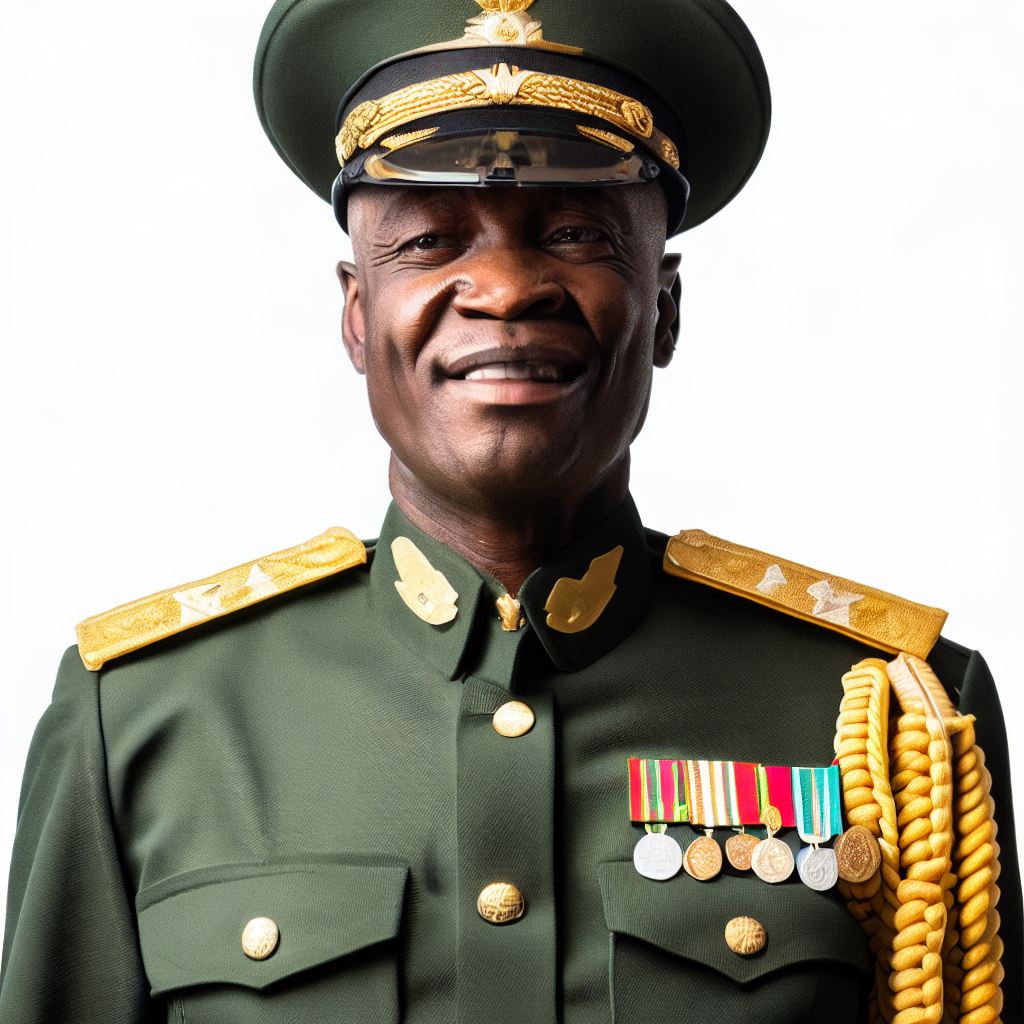Introduction
Technology plays a crucial role in the Nigeria military, enhancing its capabilities and ensuring national security. The integration of technology in military operations has become indispensable in modern warfare.
This blog post aims to explore the importance of technology in Nigeria’s military and provide insightful officer perspectives on the matter.
We will delve into how technology influences defense strategies, intelligence gathering, combat effectiveness, and overall operational efficiency.
Historical Overview of the Nigerian Military
In this section, we will delve into the historical background of the Nigerian military, highlighting key events and milestones that shaped its development.
Additionally, we will explore the use of technology in the past and its limitations within the military.
Background on the establishment of the Nigerian military
Nigerian military was established on February 3, 1960, shortly before the country gained independence.
It was primarily formed to maintain internal security and protect Nigeria’s territorial integrity.
The first Nigerian Chief of the Defence Staff was appointed in 1958, setting the stage for a centralized military command structure.
Key events and milestones
The Nigerian Civil War (1967-1970) played a significant role in the development of the military.
Post-war, the military underwent a series of reforms, including the creation of new divisions to enhance operational effectiveness.
In 1983, a military coup led to the establishment of a new civilian government, marking the beginning of military intervention in Nigeria’s political affairs.
The transition to democracy in 1999 brought about renewed focus on professionalism and the modernization of the military.
The use of technology in the past and its limitations
In the early years, the Nigerian military relied heavily on conventional weaponry and equipment, such as small arms, artillery, and armored vehicles.
However, technological advancements began to shape the military landscape. Nigeria acquired military aircraft, naval vessels, and communication systems from various countries.
Challenges arose as the military lacked essential maintenance and repair capabilities, resulting in operational limitations.
The rapid development of information technology in the 21st century presented both opportunities and challenges for Nigeria’s military.
While the use of technology enhanced communication and coordination among military units, there was a need to address cybersecurity threats and ensure the protection of sensitive information.
In fact, the historical overview of the Nigerian military reveals a path marked by significant events, reforms, and technological advancements.
From its establishment to the present day, the military has undergone various transformations, adapting to the changing national and global security landscape.
The use of technology, although initially limited, has become increasingly important in enhancing the military’s capabilities, communication, and coordination.
As we delve further into this topic, we will explore in detail how technology has influenced the Nigerian military and the perspectives of officers on its current and future applications.
Read: Nigerian Air Force Officers: A Career Overview
Current Technological Landscape in Nigeria’s Military
As technology continues to advance worldwide, it is crucial for Nigeria’s military to stay updated and equipped with the latest technological capabilities.
In this section, we will provide an overview of the current technological landscape in Nigeria’s military, discuss the types of technology being utilized, give examples of specific equipment and systems used, and highlight the importance of technological advancements.
Overview of the Current Technological Capabilities
Nigeria’s military has made significant strides in adopting modern technology. From communication systems to advanced weaponry, the military is continuously upgrading its capabilities.
An emphasis has been placed on acquiring and developing technology that enhances intelligence gathering.
Modern surveillance equipment, such as drones and satellite imagery, is being utilized for enhanced situational awareness.
The military has also improved its cybersecurity measures to protect sensitive information.
Training programs are in place to ensure personnel are proficient in operating and maintaining technology.
Types of Technology Being Utilized
- Nigeria’s military relies heavily on information and communication technology (ICT) for efficient communication.
- Advanced weapons systems, including missile defense systems and armored vehicles, are being deployed.
- The military utilizes unmanned aerial vehicles (UAVs) for surveillance and reconnaissance missions.
- Sophisticated radar systems aid in the detection and tracking of enemy aircraft and vessels.
- Electronic warfare technology is employed to disrupt and deceive enemy communication systems.
Examples of Specific Equipment and Systems Used
The following are some examples of specific equipment and systems used by Nigeria’s military:
- Mikoyan-Gurevich MiG-29 fighter jets: These provide the military with air superiority capabilities.
- T-72 battle tanks: They have enhanced firepower and superior mobility on various terrains.
- Armadillo MRAP vehicles: These offer increased protection for personnel against roadside bombs and ambushes.
- NNS Thunder patrol ship: Equipped with advanced radar and missile systems for maritime security.
- Nigerian Army Cyber Warfare Command: Responsible for safeguarding military networks from cyber threats.
Importance of Technological Advancements
- Technological advancements greatly enhance the operational capabilities and effectiveness of Nigeria’s military.
- Improved communication systems enable seamless coordination between different military units.
- Advanced weaponry and surveillance technology contribute to increased situational awareness.
- Cybersecurity measures protect classified information and prevent unauthorized access.
- Investment in research and development fosters indigenous technological innovations and self-reliance.
In essence, the current technological landscape in Nigeria’s military showcases the country’s commitment to staying abreast of global advancements.
By utilizing a wide range of technologies, from communication systems to sophisticated weapons, Nigeria’s military aims to enhance its operational capabilities and protect its national security.
Read: Nigerian Naval Officers: Roles and Responsibilities
Officer Insights on Technology in Nigeria’s Military
In order to gain a deeper understanding of the role of technology in Nigeria’s military, interviews were conducted with both current and retired military officers.
Their insights provide valuable perspectives on the impact of technology as well as the challenges faced in adopting and implementing it.
Interviews or Comments from Current and Retired Military Officers
- Lieutenant General Ahmed – “Technology has transformed the way we operate in the military. It has enhanced our capabilities and improved our efficiency in various operations.”
- Brigadier General Okafor – “With the introduction of technology, we have seen a significant improvement in intelligence gathering and real-time communication.”
- Colonel Ibrahim – “One of the main advantages of technology is its ability to enhance situational awareness, which helps us make more informed decisions in the battlefield.”
- Major Adewale – “The use of drones and surveillance systems has greatly improved our ability to monitor and detect threats, giving us an upper hand in securing our borders.”
Perspectives on the Impact of Technology in the Military
- Increased Operational Efficiency – The use of technology has streamlined various military processes, allowing for quicker decision-making and more effective execution of missions.
- Enhanced Communication – Technology has revolutionized communication within the military, enabling real-time information sharing and coordination among units.
- Improved Intelligence Gathering – Advanced surveillance systems and data analysis tools have greatly enhanced the military’s ability to gather and analyze intelligence, leading to more successful operations.
- Enhanced Situational Awareness – Technology provides military personnel with a better understanding of the battlefield, enabling them to adapt their strategies and tactics accordingly.
Challenges Faced in Adopting and Implementing Technology
- Limited Funding – The acquisition and maintenance of modern technology require significant financial resources, which can be a challenge for a developing country like Nigeria.
- Technological Knowledge and Skills Gap – The successful adoption and utilization of technology require personnel with specialized knowledge and skills, which may be lacking in some areas of the military.
- Cybersecurity Threats – As technology advances, the military faces new cybersecurity challenges that need to be addressed to prevent data breaches and unauthorized access to sensitive information.
- Infrastructure Limitations – The effective use of technology in the military relies on a robust and reliable infrastructure, which may be lacking in certain regions or during military operations in remote areas.
Despite these challenges, it is evident that technology has had a significant positive impact on Nigeria’s military.
Continuous efforts are being made to address the obstacles and ensure that the military remains at the forefront of technological advancements, enabling it to better protect the nation and its citizens.
Read: The Ethics of Service: Nigerian Military Officers
Success Stories of Technological Integration
In recent years, Nigeria’s military has made significant advancements in incorporating technology into its operations.
These successful deployments have yielded positive outcomes and achieved commendable results. Let us delve into some examples of specific operations where technology played a crucial role:
Operation Lafiya Dole
The use of surveillance drones provided real-time intelligence, enabling targeted strikes on Boko Haram hideouts.
Technologically advanced weapons systems improved the accuracy of airstrikes, limiting collateral damage.
Communication systems facilitated seamless coordination between ground troops and air support, resulting in successful rescue missions.
Operation Python Dance
The deployment of state-of-the-art surveillance equipment helped monitor and curb criminal activities in the Southeast region.
Technology-enabled communication systems supported the exchange of vital information, enhancing the effectiveness of the operation.
Access to modern geospatial mapping tools aided in the identification of illegal activities, leading to successful apprehensions.
Operation Safe Haven
The integration of biometric technology enhanced security screening procedures at checkpoints and barracks.
High-resolution cameras with facial recognition capabilities helped identify potential threats before they could cause harm.
Vehicle tracking systems minimized the risk of unauthorized movements and improved overall surveillance.
These are just a few examples showcasing the positive outcomes achieved through the successful integration of technology in Nigeria’s military operations.
Impact of the advancements
The impact of these advancements has been noteworthy:
Increased Efficiency
Proper utilization of technology has significantly reduced response times and streamlined military operations.
The automation of processes has eliminated unnecessary bureaucratic delays, allowing for swift decision-making.
Enhanced Situational Awareness
The integration of advanced surveillance systems and data analytics tools has greatly improved the military’s understanding of the terrain, enemy tactics, and civilian movements.
This heightened situational awareness has given troops a distinct advantage both on the battlefield and in peacekeeping missions.
Improved Safety
The use of technological innovations like GPS tracking devices and protective equipment has ensured the safety of military personnel.
Real-time monitoring of soldiers in the field has enabled rapid response to emergencies, minimizing casualties.
Targeted Operations
With the assistance of technology, Nigeria’s military has conducted precise and targeted operations against insurgents and criminal elements.
The accurate intelligence gathered through surveillance systems has aided in planning and executing successful missions while minimizing collateral damage.
Public Confidence
The successful deployments of technology have instilled a sense of confidence in the general public.
The improved efficiency, transparency, and effectiveness of the military’s operations have bolstered public support and trust.
It is crucial to acknowledge that technology is not a panacea for all challenges faced by Nigeria’s military.
However, these success stories illustrate the positive impact that technology integration can have on operational effectiveness.
The Nigerian military needs to continue investing in research and development to stay abreast of technological advancements and build on these achievements.
Through continued collaboration with technological partners, Nigeria’s military can further leverage technology to ensure peace, security, and national development.
Read: Leadership Skills: Being an Officer in Nigeria’s Army

Areas for Improvement and Future Prospects
When it comes to technology in Nigeria’s military, there are several areas where further enhancement of technological capabilities is essential.
Nigerian officers have provided insightful suggestions on potential future advancements that can significantly improve the country’s defense system.
In this section, we will explore these areas and discuss the significance of continuous innovation and staying up-to-date.
Enhancing Technological Capabilities
Nigeria’s military can benefit from investing more resources in improving their technological capabilities.
Officers emphasize the need for advanced communication systems, surveillance technologies, and intelligence gathering tools.
Emphasis on Cybersecurity
With the growing threat of cyber warfare, officers recommend strengthening Nigeria’s cybersecurity infrastructure.
Developing robust defenses against cyber attacks is crucial to protect sensitive military information and prevent potential breaches.
Drones and Unmanned Systems
The use of drones and unmanned systems has become increasingly important in modern warfare.
Nigerian officers suggest investing in these technologies to conduct reconnaissance missions, gather intelligence, and monitor border areas more efficiently.
Training and Education
Continuous training and education play a vital role in maximizing the potential of technological advancements.
Officers recommend providing specialized training programs to military personnel, ensuring they are equipped with the knowledge and skills to utilize new technologies effectively.
Future Advancements
Nigerian officers envision several potential future advancements that can revolutionize the country’s military technology.
Artificial Intelligence (AI)
AI has the potential to transform the Nigerian military by automating tasks, improving decision-making processes, and enhancing efficiency.
Officers suggest exploring AI applications in areas such as logistics management, threat analysis, and tactical planning.
Robotics and Autonomous Systems
Integrating robotics and autonomous systems can reduce human risk in warfare and enable the military to execute complex operations efficiently.
Nigerian officers recommend adopting these technologies in areas such as bomb disposal, surveillance, and reconnaissance.
Space Technology
Space technology can play a crucial role in enhancing Nigeria’s military capabilities.
Officers suggest investing in satellite systems for improved communication, earth observation capabilities, and early warning systems.
Importance of Continuous Innovation
The significance of continuous innovation cannot be overstated in today’s rapidly evolving technological landscape.
Military Adaptability
Continuous innovation allows the military to adapt to emerging threats and challenges effectively.
By staying updated with the latest technological advancements, Nigeria’s military can maintain its competitive edge on the battlefield.
Publish Your Professional Profile, Business or Brand
Showcase your expertise, gain trust, and boost visibility instantly on Professions.ng.
Publish NowImproved Operational Efficiency
Incorporating new technologies enhances operational efficiency by simplifying complex processes, reducing human errors, and increasing the speed of decision-making.
This, in turn, enables the military to respond more swiftly and effectively to evolving situations.
International Collaboration
Continuous innovation in technology fosters international collaboration.
Nigeria can establish partnerships with technologically advanced nations, allowing for knowledge sharing, joint research, and development of cutting-edge military technologies.
Enhanced National Security
Staying up-to-date with technological advancements and continuously innovating strengthens Nigeria’s national security.
By investing in advanced technologies, the military can better protect the country’s borders, respond to threats, and ensure the safety of its citizens.
In short, Nigeria’s military has vast potential for further enhancing its technological capabilities.
By investing in areas such as cybersecurity, drones, AI, and space technology, and emphasizing continuous innovation, Nigeria can strengthen its defense system and ensure a secure future.
Potential Impacts on National Security
How technology in the military contributes to national security
- The utilization of technology in Nigeria’s military plays a vital role in safeguarding national security.
- Advanced technology enhances surveillance capabilities, enabling better monitoring of borders and territorial waters.
- Sophisticated communication systems enable quick and secure transmission of critical information among military units.
- The integration of technology in intelligence gathering facilitates early detection of security threats and potential attacks.
- Unmanned aerial vehicles (UAVs) provide real-time aerial surveillance, enhancing situational awareness and response capabilities.
- Improved weapons systems and military equipment enhance the efficiency and effectiveness of defense operations.
- Technology-driven military training programs equip Nigerian soldiers with advanced skills and tactics, ensuring preparedness.
- The digitalization of military operations enables better coordination between different branches and units of the military.
- Technological advancements enable the development of sophisticated defense systems to counter emerging threats.
- Effective use of technology in the military deters potential adversaries and contributes to maintaining national sovereignty.
Potential Risks and Vulnerabilities
- Reliance on technology creates vulnerabilities, as adversaries can exploit weaknesses in cyber defenses.
- Cyber attacks on military networks can disrupt operations, compromise sensitive data, and undermine national security.
- Increasing dependence on technology exposes the military to potential infrastructure failures and system malfunctions.
- The introduction of new technologies may require regular updates and maintenance, which can strain resources.
- Rapid technological advancements may outpace the ability of military personnel to adapt and counter emerging threats.
- Supply chain vulnerabilities can be exploited, leading to the infiltration of compromised hardware or software.
- Insufficient training and awareness among military personnel can leave them susceptible to social engineering and phishing attacks.
- The rapidly evolving nature of technology makes it challenging to keep up with emerging cyber threats.
- A lack of domestic technological capabilities can make Nigeria dependent on foreign suppliers, posing security risks.
- Cyber espionage and information warfare can undermine Nigeria’s military capabilities and compromise national security.
Addressing the Need for Cybersecurity
- Nigeria’s military should prioritize the development and implementation of robust cybersecurity measures.
- Investments in cybersecurity training and education for military personnel are crucial to enhance their awareness and skills.
- The establishment of dedicated cybersecurity units within the military can help monitor and respond to cyber threats promptly.
- Collaboration and information sharing with international partners can strengthen Nigeria’s cybersecurity defense capabilities.
- Regular vulnerability assessment and penetration testing can identify and mitigate potential weaknesses in military systems.
- Strict control and regulation of technology transfers and foreign suppliers can reduce the risk of compromising national security.
- The development of domestic technological capabilities can reduce Nigeria’s dependence on foreign suppliers and enhance security.
- Continuous research and development efforts should be made to stay ahead of emerging cyber threats.
- Close cooperation between the military and civilian cybersecurity agencies can ensure a holistic and comprehensive approach to cybersecurity.
- Regular monitoring of information systems and network traffic can help detect and respond to cyber attacks in a timely manner.
Conclusion
This blog post highlighted the significance of technology in Nigeria’s military. We discussed how officers perceive the impact of technology on their operations.
Throughout the article, we emphasized the need for advanced technology to enhance the effectiveness and efficiency of the Nigerian military.
By adopting modern technologies, Nigeria can better combat security challenges, improve intelligence gathering, and strengthen defense capabilities.
It is clear that technology plays a crucial role in ensuring the safety and security of the nation.
Let us remember the words of General John A. Shalikashvili, who said, “The world has become interdependent and technology-dependent. Our military is no exception.”
Thus, investing in and harnessing technology is not just a requirement but also a necessity for Nigeria’s military to fulfill its mission and protect its citizens.




